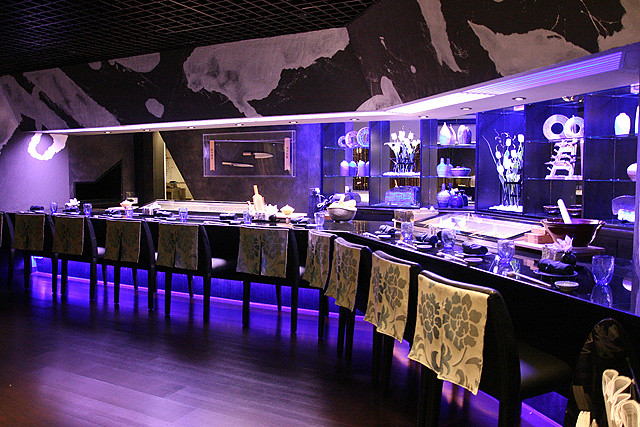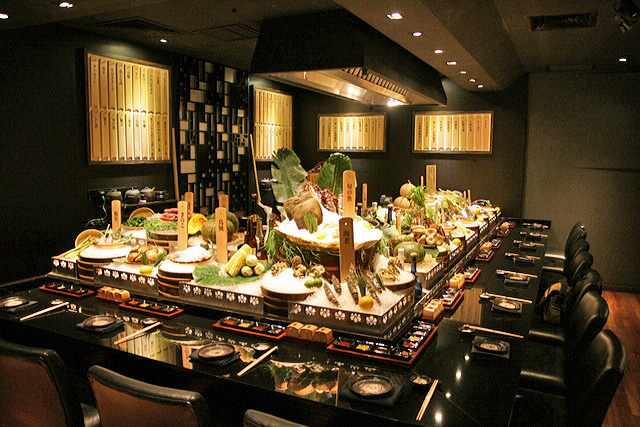It's tremendously inspiring to talk to people who are passionate and knowledgeable about food. Mikuni's Executive Chef Moon Kyung Soo blew our socks off when he brought us through the three sections of the restaurant, and spoke in fascinating detail about the thought and science that goes into the preparation of sushi. すごいですね!Amazing.
Here he is, showing us the three styles of sushi - Edomae, buffet (thinner slice) and standard restaurant offering, if I remember correctly.
Mikuni means "three countries" in Japanese, and appropriately there are three main culinary disciplines (sushi, teppanyaki and robatayaki) in the restaurant (by now, most of you would know this place took over Inagiku at the Fairmont).
Let me show you the interior - these are photos I shot from my previous visit (Winter Robata). It is a truly gorgeous place, isn't it?

The sushi counter with dramatic blue and violet lighting. This is the first section you'll see upon entering the restaurant. It's also opposite the little sake bar they have.

The teppanyaki semi-circular table is specially placed some distance away from the hot grilling plate, so that diners will not get any splatter on their clothing.

The robatayaki room practically looks palatial! All the fresh ingredients laid before you to be grilled right before your eyes. This grilling concept is inspired by Japanese fishermen who cooked their catch over a charcoal fire ("ro" means fireplace) using an oar as cooking utensil. Today a wooden paddle is used to pass the food to guests as a nod to that practice.
Anyway, on to the food! Chef Moon prepared for us a selection of some seasonal dishes and regular favourites on the menu from across all three stations.

STARTER
Fresh Yuzu Egg Custard with Rice Cake and Hokkaido Crab Meat
This is a new creation. There's a mochi ball in there which is quite unusual for chawanmushi. Yuzu and crab meat go really well together in this though.

SASHIMI
Octopus sashimi with Japanese Plum Shiso and Truffle Soya
This was designed with spring in mind. Doesn't it absolutely convey that? The thinly sliced and tender octopus is nicely doused with a truffle infused soy marinade that makes even the slice of kyuri (Japanese cucumber) delicious. The plum shiso perks things up with salty tang.

If you don't take raw stuff, they will give you a grilled version. It's even more savoury!

SUSHI
Edomae Style sushi
Toro, Botan Ebi with Sea Urchin and Gohata Sushi
Oh fresh juicy flesh from the seas! Some of the sushi pieces get a dab of the housemade soy sauce (deliberately lower in sodium, so that you don't get parched with thirst if you dip too much into it). That creamy dollop of uni on top of the botan ebi is sheer genius. It makes the soft but slightly crunchy texture of the prawn come alive.

And of course, nothing less than freshly grated REAL wasabi will suffice.

TEPPANYAKI
Teppanyaki Prawn with Golden Sauce
Oh my, this beauty is so rich and sinful, but just give in to temptation. The golden cream is made from egg, mustard, sesame paste and shoyu. Yes, it's got a distinctive Chinese signature to its taste, but who cares when it's so good! The prawns are seared just right, and the tobiko adds pop (literally) to the dish. Little wonder it's one of their teppanyaki mainstays.

GRILL
Robata Style Kagoshima Wagyu and Lily Bulb
Kagoshima wagyu, I love you.
Hats off to Head Robatayaki chef Yoshiyuki Nobukawa for marinating and grilling this to perfection. There is a beautiful smoky char aroma complementing the luxurious beefy taste. Justice done.

You can also opt for seafood, if you don't take beef. Grilled red snapper here. Oh, you see that pale yellow mash with egg yolk in it? It's lily bulb mash - very elegant alternative to mash potato. Beautiful subtle fragrance. And the texture is lighter and more airy.
The green leaf roll? It's got some sticky rice flour cake inside.

DESSERT
Sakura Ice Cream and Red Bean
Dessert is so often an afterthought or really simple at Japanese restaurants. But Chef Moon believes it's important to end the meal with something to amaze the palate.
Yes, main dishes are important, but the first and last dishes are critical in setting impressions.
The first dish says, "Welcome, this is our quality..."
The last dish says, "Thank you, please come again..."
And this Sakura ice cream does just that - makes you want to come back again. There is a slightly salty note to this exquisite confection. The floral aspect works like a dream here, unlike other flowers (e.g. lavender). Get it while it's still springtime, because it is a seasonal special.
So those were the courses. We got a chance afterwards to see the teppanyaki chefs in action.

Teppanyaki is all about showmanship. There are two ways of doing this - the entertaining (top) and the classic (bottom) styles. Chef Eric Yong (bottom) believes in pairing the right secret sauces and marinades to bring out the flavours of meat and seafood.

Nothing like a flambe to stoke the appetite. There's something very primal about a big fire. Gimme meat! Now!

Chef Moon then gave us a most fascinating discourse on aspects of sushi preparation. The restaurant serves Edomae Nigiri style sushi that maintains a delicate balance between fish and accompanying ingredients.
The size of fish and volume of rice matters. I was surprised to learn that the very long strip of "neta" (topping) draping a tiny mound of rice is actually not ideal. You need the right ratio of fish and rice for best mouthfeel.
Depending on the seafood, Head Chef Tsunenori Yamamoto sprinkles some sushi with salt, while gently brushing others with the house-made soy that doesn't overpower the fish. Technically you don't even need to dip it in soy sauce anymore.

For example, the sushi rice at Mikuni is only flavoured with vinegar and salt. Unlike other restaurants, they do not add sugar as this will mask the natural, delicate sweetness of the seafood.
Also, older rice is better for sushi, not new rice. They soak the rice in water before steaming, so it's less sticky, easier to mould, and the rice grains remain individual instead of mashed together. The rice separates easily in your mouth as you chew.

And this is how they serve uni sushi (left). When it's only rice and uni, you get to savour the uni's creaminess immediately and completely. In the gunkan (boat-style) sushi, the seaweed wrapped around the rice actually interferes with the experience. You are fighting the sheet of seaweed which is very strong, and by the time it disintegrates, the uni would have practically liquified and lost its original texture.

There is also special consideration given to the technique of slicing the fish for the topping. See the beveled edge with angled protrusion (left side of the maguro/tuna)? Your tongue will sense more texture when you chew. With the flat slice (right piece), it literally is more one-dimensional.
Chef Moon and his team give great thought to blending modern ideas with century-old Japanese techniques. Most fine-dining Japanese restaurants source from the same handful of top quality suppliers in Singapore. So, to stay on top of the game, he must think of ways to differentiate Mikuni with essentially same ingredients that other restaurants are also offering.
Mikuni's Restaurant Manager Nobuhiko Sano is also the country's first certified Sake Sommelier. Ask him for sake pairings to go with your dishes.

Mikuni certainly takes pride in its craft. When we were there during lunch, it was quite packed, even though most of the lunch sets start from S$80++ (but it's good value considering the quality of ingredients and preparation skill). Plus, any restaurant that can make these insanely delicious seafood crackers will have me captive and coming back.
------------------------------------
Also, check out Mikuni at SAVOUR 2013 from 11-14 April at the F1 Pit Building and Paddock, 1 Republic Boulevard. Here are some of the dishes they will showcase:
Sukiyaki Egg Custard
– This signature dish at Mikuni is a contemporary take on chawanmushi. Executive Chef Moon adds luxurious nuggets of foie gras and finishes off the savoury egg custard with a sukiyaki foam. The egg is creatively presented in a nest of straw.
Truffle Kampachi
- Slivers of yellow tail are dressed in a combination of yuzu, volcanic black sea salt and truffle essence. It is garnished with a flourish of micro-herbs and whimsically presented in a Mikuni tin can. This one is almost too pretty to eat.
------------------------------------
MIKUNI JAPANESE RESTAURANT
Level 3, Fairmont Singapore
80 Bras Basah Road
Singapore 189650
Tel: +65 6431-6156
Open daily
Lunch: 12:00pm to 2:30pm (Last Order 2.15pm)
Dinner: 6:30pm to 10:30pm (Last Order 10.15pm)
Dress Code: Smart Casual
Thanks to Mikuni and Fairmont Singapore for the invitation

this looks and reads really awesome! THink i'll drop by and treat my sis on her birthday.
ReplyDeleteYou are such a good brother! :)
Delete